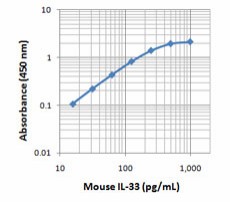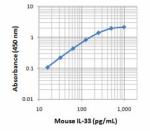- Clone
- Poly5165 (See other available formats)
- Regulatory Status
- RUO
- Other Names
- Il-1f11, Nuclear factor from high endothelial venules (NF-HEV)
- Isotype
- Goat Polyclonal Ig

| Cat # | Size | Price | Quantity Check Availability | ||
|---|---|---|---|---|---|
| 516501 | 100 µg | $350.00 | |||
IL-33 belongs to the IL-1 family and is closely related in structure to IL-18 and IL-1b. IL-33, IL-1b, and IL-18 are synthesized as biologically inactive precursor and are cleaved by the enzyme caspase-1 to be secreted as active mature forms. IL-33 stimulates target cells by binding to the IL-1R/TLR superfamily member ST2 and subsequently activates NF-κB and MAPK pathways via identical signalling events to those observed for IL-1b. In addition, IL-33 is a nuclear factor (NF-HEV) abundantly expressed in high endothelial venules from lymphoid organs that associates with chromatin and exhibits transcriptional regulatory properties.
Product Details
- Verified Reactivity
- Mouse, Rat
- Antibody Type
- Polyclonal
- Host Species
- Goat
- Immunogen
- Mouse IL-33, amino acids Ser109-Ile266 (Accession# NM_133775) was expressed in E. coli.
- Formulation
- Phosphate-buffered solution, pH 7.2, containing 0.09% sodium azide.
- Preparation
- The antibody was purified by antigen affinity chromatography.
- Concentration
- 0.5 mg/ml
- Storage & Handling
- The antibody solution should be stored undiluted between 2°C and 8°C. Do not freeze.
- Application
-
ELISA Capture - Quality tested
- Recommended Usage
-
Each lot of this antibody is quality control tested by ELISA assay. For use as an ELISA capture antibody, a concentration range of 0.5-2 µg/ml is recommended. It is recommended that the reagent be titrated for optimal performance. To obtain a linear standard curve, serial dilutions of IL-33 recombinant protein ranging from 1000-15.6 pg/ml are recommended.
- Application Notes
-
ELISA Capture: The purified Poly5165 antibody is useful as a capture antibody in a sandwich ELISA assay, when used in conjunction with the biotinylated Poly5165 antibody (Cat. No. 516503) as the detecting antibody and recombinant mouse IL-33 (Cat. No. 580509) as the standard.
-
Application References
(PubMed link indicates BioLegend citation) -
- Gao X, et al. 2015. J Immunol. 194:438. PubMed
- Product Citations
-
- RRID
-
AB_2561333 (BioLegend Cat. No. 516501)
Antigen Details
- Distribution
-
High levels of mouse IL-33 mRNA are detected in the stomach, lung, spinal cord, brain, and skin. Expression within these organs is restricted to a few cell types, such as epithelial cells, fibroblasts, and smooth muscle cells. In addition, mouse IL-33 mRNA is found in resting dendritic cells and activated macrophages. Endothelial cells constitute a major source of IL-33 mRNA in chronically inflamed tissues.
- Function
- IL-33 drives production of Th2-associated cytokines from in vitro polarized Th2 cells. In mice, IL-33 injection induced the expression of IL-4, IL-5, and IL-13 and led to severe pathological changes in the lung and the digestive tract. In addition, IL-33 acts as a chemoattractant for Th2 cells, both in vitro and in vivo. TNF-a and IL-1b are activators of IL-33 transcription in fibroblasts and keratinocytes.
- Ligand/Receptor
- IL-33 binds to the IL-1 family receptor T1/ST2 and IL-1RAcP (IL-1 receptor associated protein).
- Cell Type
- Epithelial cells, Fibroblasts
- Biology Area
- Immunology
- Molecular Family
- Cytokines/Chemokines
- Antigen References
-
1. Schmitz J, et al. Immunity 2005 23:479
2. Barksby HE, et al. C Exp Immunol 2007 149:217
3. Arend WP, et al. ImmRev 2008 223:20
4. Suzukawa M, et al. J. Immunol. 2008 181:5981
5. Moussio C, et al. PlosOne 2008 10:e3331. - Gene ID
- 77125 View all products for this Gene ID
- UniProt
- View information about IL-33 on UniProt.org
Other Formats
View All IL-33 Reagents Request Custom Conjugation| Description | Clone | Applications |
|---|---|---|
| Biotin anti-mouse IL-33 | Poly5165 | ELISA Detection |
| Purified anti-mouse IL-33 | Poly5165 | ELISA Capture |
Compare Data Across All Formats
This data display is provided for general comparisons between formats.
Your actual data may vary due to variations in samples, target cells, instruments and their settings, staining conditions, and other factors.
If you need assistance with selecting the best format contact our expert technical support team.


